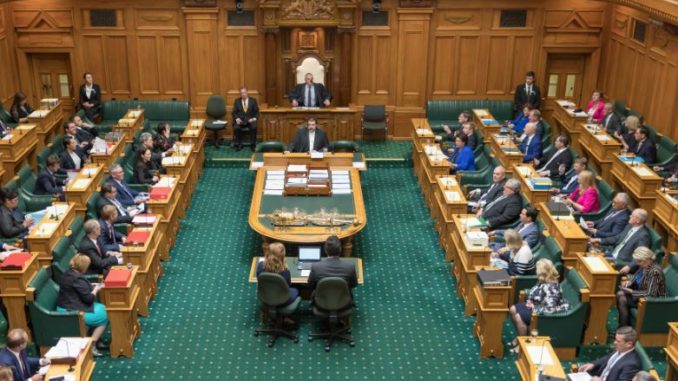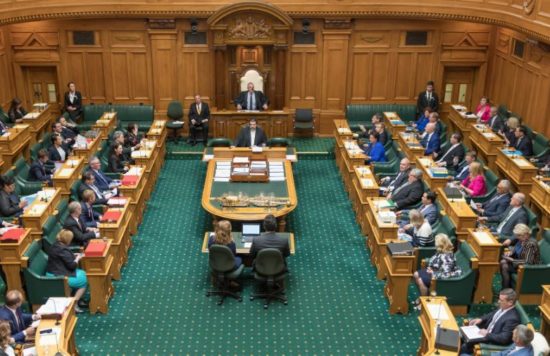
 The Education and Training Bill (see sections 53-58) proposes some significant changes to religious instruction in secular state primary schools. The main change is a move from opt-out, where parents have to provide written authority for their children to be removed from the classes, to opt-in, where parents have to ask for their children to attend the classes. Considering that the school has to “close” the classroom to allow religious instruction, it was always absurd to have to ask to be removed from something that was extra-curricular anyway.
The Education and Training Bill (see sections 53-58) proposes some significant changes to religious instruction in secular state primary schools. The main change is a move from opt-out, where parents have to provide written authority for their children to be removed from the classes, to opt-in, where parents have to ask for their children to attend the classes. Considering that the school has to “close” the classroom to allow religious instruction, it was always absurd to have to ask to be removed from something that was extra-curricular anyway.
However, while the bill is a step forward in terms of permission, it provides fresh legal justification for religious evangelism in primary schools that should be welcoming to children from all religious backgrounds. Below is my (rather rushed) submission to government. I’ve already realised that I forgot to add in a complaint about the bill allowing teachers to switch from their normal teaching role to religious evangelism in the same school. This is an appalling conflict of interest and confusing for children. Their teacher should be an unbiased role model who doesn’t promote their personal religious views in the classroom.
Non-neutral, partisan teaching or institutional observation of religious faith is antithetical to the values of diversity and inclusiveness that the Ministry of Education espouse.
Allowing a Board of Trustees to allow privileged access for a preferred religious group sends a message to both children and parents that are not part of this group that they are “other” than what the board considers they should be.
Closing a school or classroom in order to promote this preferred and privileged religious view, inherently discriminates against children who are forced to stop their curriculum learning in order for their peers to receive religious faith-teaching.
Shifting from an opt-out to an opt-in process is the lesser of two evils but still does not change the fact that a group of parents within the school community are receiving privileged access and rights for their religious views in a secular school.
The legal right to introduce religious instruction is also discriminatory towards people with no religion (who make up around 50% of our population), as there is no allowance within the law for the promotion of views that deny religious claims. So, while the Church of the Flying Spaghetti Monster are legally allowed to teach children to wear colanders as a show of respect to their god, a group representing atheists are not legally allowed to enter schools under the same legislation in order to teach that there are no gods, as they are not part of a religion. The legislation itself is biased against half the population, in favour of religious adherents.
Shifting from opt-out to opt-in does not address the problems of religious privilege and the lack of protection for children against religious impositions. The reason for secular education being the basis of the Education Act 1877, was concern over religious groups competing for access to children within a state school. On this basis, given the opportunity to remove this distasteful scramble for an opportunity to indoctrinate children in a religious faith, why would we compromise the protection that secular education provides children to give regular access to any group with a religious agenda? Surely, the state should be teaching children “about” religion instead of acting as a provider of children’s minds? Allowing opt-in faith teaching is an abdication of responsibility by the state to protect children from religious pressures, no matter where those pressures come from.
The Supplementary Analysis Report notes that both the NZSTA and the NZEI support the shift to opt-in. However, neither of these organisations have surveyed their members on this issue for many, many years and they both have previously refused to discuss their reasons for supporting religious instruction in the first place. (1) (2)
In addition to the concerns above, should this bill be adopted as it is, it still fails to protect children and parents in a number of ways.
There are no requirements;
- for what information has to be provided to parents and in what format.
- to make the opt-in consent, explicitly opt-in and not the yes/no options that many schools currently use.
- to use a specific opt-in form format and wording.
- to provide alternatives that are of a high quality and not inferior to the religious instruction syllabus.
- for the school staff to refrain from actively promoting religious instruction.
- to limit religious observances.
- to only allow religious instruction outside normal teaching hours.
- for the ERO to review religious instruction practices.
- for the MOE to monitor religious instruction in schools.
This state-sanctioned bullying of children in schools via religious proselytising has to stop.
My own daughter, who I opt out of religious instruction has said to me; “Dad, I just want to be the same as everyone else”. The teacher that takes the opt-out classes is widely feared by children and is hostile to anyone who criticises religious instruction. She has also complained to me about how the size of the opt out class is growing, as if it were a problem with the parents who opt out, rather than a problem of parents wanting their religious faith promoted in the school!
While the children in the religious instruction classes at my daughter’s school perform plays, dress up, sing songs, do colouring in and get treats such as stickers and pencils, the kids in the opt out class watch a YouTube video about values and play the same 6 values-based board games they’ve played since they started school at age 5. The situation is so bad at some schools that parents often prefer to take their children to school late, to avoid both religious instruction and opt-out classes. However, we still do this by running the gauntlet of smug and entitled “bible teachers” who tend to gather around the entrance after their lessons.
This division and othering that children experience leads to feelings of doubt and insecurity. It stigmatises children, who are then questioned by the “Christian kids” wanting to know why they don’t go to bible class or believe in god? Considering our appalling mental health record for young people, why is a practice that separates children by the religious views of their parents allowed into schools? Why are we not teaching about the diversity of beliefs and encouraging understanding and tolerance rather than allowing promotion of a favoured religious view?
The main group behind religious instruction in New Zealand, the Churches Education Commission (now re-branded to “Launchpad”) has repeatedly denied that they are involved in evangelising children(3). However, they have also referred to schools as “an under-utilised mission field”(4) and called for churches to “own their local school”(5).
Instead of allowing a BOT or community vote to remove the fair application of secular education and allow representatives from a religious group like this in to promote their faith, why are we not going back to first principles? Shouldn’t we ask why we are allowing the promotion of anyone’s religion in our secular state primary schools? If we applied the same approach to political views, would we allow a board of trustees to approve a National Party values teaching class that the kids from Labour-supporting families could opt out of if their parents asked the school in writing? Or would changing it to opt-in somehow justify promotion of National Party values during normal school time?
My daughters go to a school that teaches from year 1 to year 8. If religious instruction is taught for 20 hours a year and not removed, this equates to 160 hours of teaching time lost before they reach high school. Six and a half weeks of classroom teacher time lost to religious evangelism.
Stand up for what is right and fair and remove religious observances and religious instruction from secular state primary schools. Opt-in is already available for families who want to choose religious faith teaching for their children in churches, mosques and temples throughout the country.
(1) https://religiouseducation.co.nz/nzsta-advice-on-religious-instruction-may-2019-review/
(2) https://religiouseducation.co.nz/nzei-supports-discrimination-by-religious-instruction/
(4) http://www.stuff.co.nz/national/7159949/Christians-target-schools-in-mission
(5) https://religiouseducation.co.nz/cec-stephanie-sewell-own-local-primary-school/


Leave a Reply
You must be logged in to post a comment.